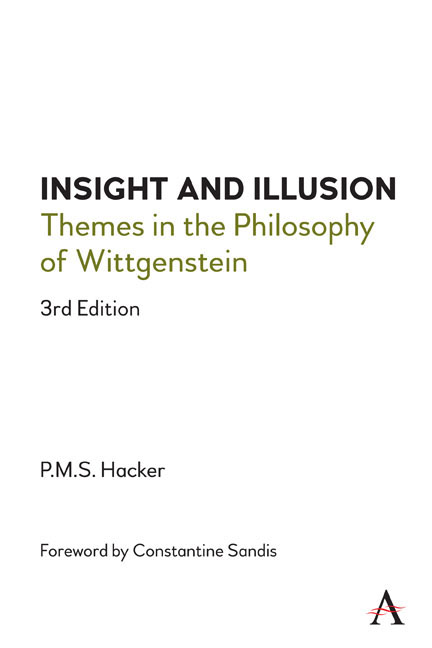Book contents
- Frontmatter
- Dedication
- Contents
- FOREWORD
- PREFACE TO THE REVISED EDITION
- PREFACE TO THE FIRST EDITION
- LIST OF ABBREVIATIONS
- I WITTGENSTEIN’S EARLY CONCEPTION OF PHILOSOPHY
- II THE DIALOGUE WITH FREGE AND RUSSELL
- III MEANING, METAPHYSICS, AND THE MIND
- IV EMPIRICAL REALISM AND TRANSCENDENTAL SOLIPSISM
- V DISINTEGRATION AND RECONSTRUCTION
- VI WITTGENSTEIN’S LATER CONCEPTION OF PHILOSOPHY
- VII METAPHYSICS AS THE SHADOW OF GRAMMAR
- VIII THE REFUTATION OF SOLIPSISM
- IX PRIVATE LINGUISTS AND PUBLIC SPEAKERS
- X ‘A CLOUD OF PHILOSOPHY CONDENSED INTO A DROP OF GRAMMAR’
- XI CRITERIA, REALISM AND ANTI-REALISM
- INDEX
PREFACE TO THE REVISED EDITION
Published online by Cambridge University Press: 24 February 2022
- Frontmatter
- Dedication
- Contents
- FOREWORD
- PREFACE TO THE REVISED EDITION
- PREFACE TO THE FIRST EDITION
- LIST OF ABBREVIATIONS
- I WITTGENSTEIN’S EARLY CONCEPTION OF PHILOSOPHY
- II THE DIALOGUE WITH FREGE AND RUSSELL
- III MEANING, METAPHYSICS, AND THE MIND
- IV EMPIRICAL REALISM AND TRANSCENDENTAL SOLIPSISM
- V DISINTEGRATION AND RECONSTRUCTION
- VI WITTGENSTEIN’S LATER CONCEPTION OF PHILOSOPHY
- VII METAPHYSICS AS THE SHADOW OF GRAMMAR
- VIII THE REFUTATION OF SOLIPSISM
- IX PRIVATE LINGUISTS AND PUBLIC SPEAKERS
- X ‘A CLOUD OF PHILOSOPHY CONDENSED INTO A DROP OF GRAMMAR’
- XI CRITERIA, REALISM AND ANTI-REALISM
- INDEX
Summary
In the course of the fifteen years since I wrote Insight and IllusionI have continued to study and write about the philosophy of Wittgenstein. During this period many further volumes culled from his voluminous Nachlass,as well as lecture notes taken by his students, have been published and, indeed, the whole of the Nachlasshas been made available in xerox. This extensive material illuminates countless aspects of his better known works, in particular the Tractatusand Philosophical Investigations,and the results of researches into it were incorporated in two volumes I wrote together with Dr G. P. Baker on the Philosophical Investigations,viz. Wittgenstein: Understanding and Meaning(1980) and Wittgenstein: Rules, Grammar and Necessity(1985). As I struggled to understand the thoughts of ‘the first philosopher of the age’ I came to recognize that on many issues I had previously misunderstood him, sometimes as a result of reading his works through the spectacles of Oxford philosophy and its preoccupations in the 1960s. When I was offered the opportunity to produce a revised second edition of Insight and Illusion,I welcomed the chance to correct, in the light of this subsequent research, the distorted picture I had earlier sketched. For not all struck me as hopeless, and it seemed worthwhile to set the record as straight as I could. This did, however, mean that I was committed to very extensive rewriting.
In the Preface to the first edition I compared the structure of the book to the elements of a theatrical production, with a central drama, a set, and a back-cloth. Surveying the production afresh, it did not seem as flawed as Hamletwithout the Prince, but the back-cloth, which consisted of a sketchy presentation of Wittgenstein's conception of meaning, looked more like Piccadilly Circus in the rush-hour than Elsinore Castle. I had been much impressed with the idea that it is illuminating to view the Tractatusas a paradigm of realism or truthconditional semantics, and the Investigationsas informed by a wholly different approach to meaning inspired by constructivism or intuitionism in mathematics, namely anti-realism or assertion-conditions semantics.
- Type
- Chapter
- Information
- Insight and IllusionThemes in the Philosophy of Wittgenstein, pp. xv - xviiiPublisher: Anthem PressPrint publication year: 2021



